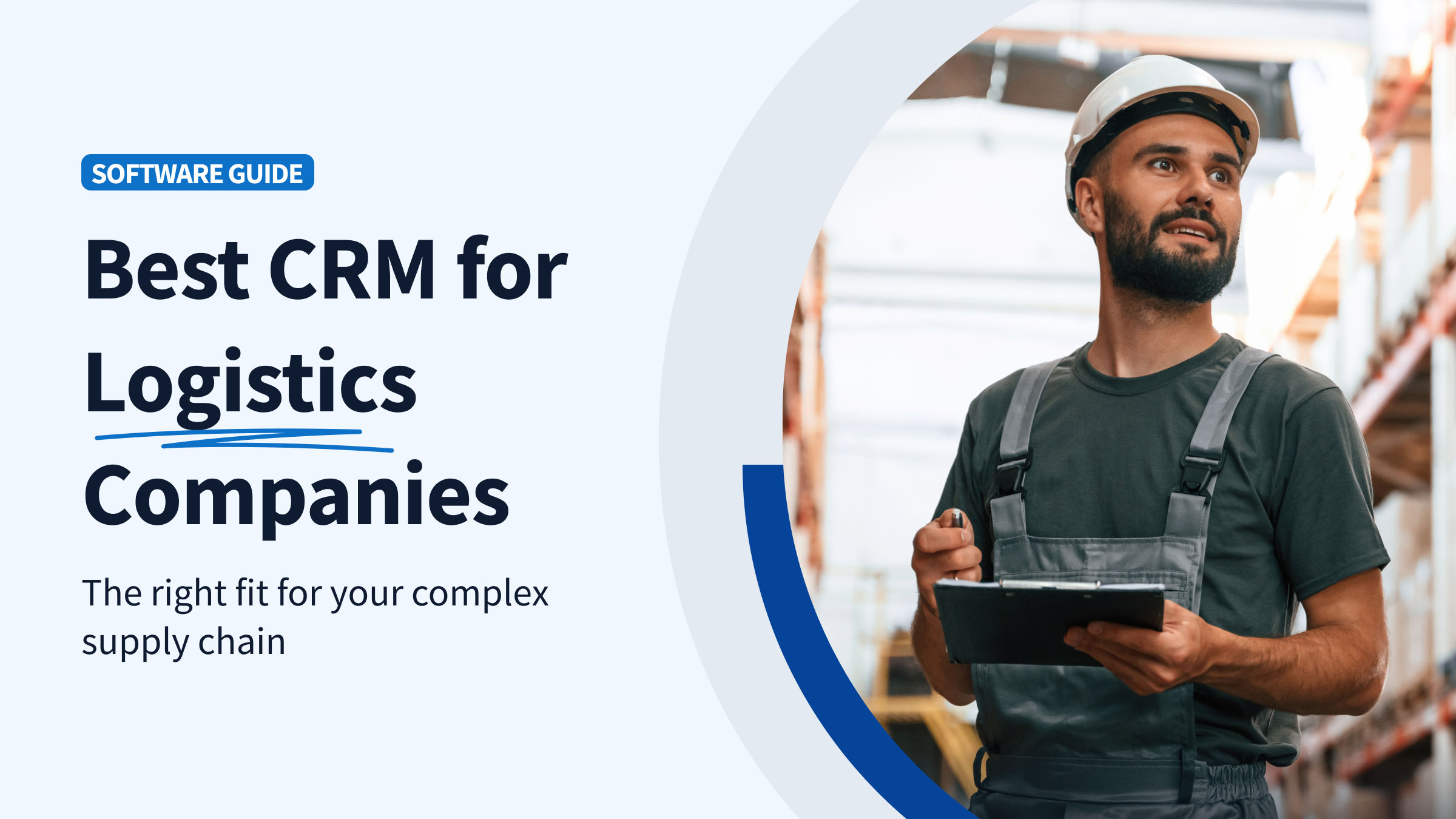Running logistics in 2026 isn’t just about moving goods from point A to point B. With increasing customer expectations, complex supply chains, and the need for real-time data, logistics companies need robust Customer Relationship Management (CRM) systems made to tackle their unique challenges.
For tasks like coordinating multi-stop deliveries, managing long customer relationships, or handling thousands of transactions, logistics companies need more than just a spreadsheet and a shared inbox to stay ahead.
A CRM helps businesses in the logistics industry manage leads, track communications, organize shipments, support customers, set pricing, and streamline operations, all from a single platform.
But with so many CRM systems out there, it’s not always clear which ones actually suit the complex, high-volume, time-sensitive world of transportation and logistics.
This list breaks down the 7 best CRM solutions for logistics companies in 2026, with a focus on tools and functionality that solve real problems like:
- Managing customer data across multiple shipments and touchpoints.
- Keeping your sales and service teams aligned.
- Automating lead capture and follow-ups.
- Integrating with accounting tools like QuickBooks.
- Giving customers visibility into their own shipments.
- Customizing workflows to fit your unique operations.
What to look for in a logistics CRM
Before diving into the list, here are the must-have features that a logistics business should look for when evaluating a CRM.
Custom workflows
No two logistics companies operate exactly the same. Whether you’re coordinating last-mile deliveries, managing freight forwarding, or running a regional courier network, your processes are unique. A good logistics CRM software should be flexible enough to match how you already work and not force you into rigid templates.
Look for a CRM that allows you to build custom workflows for quoting, dispatching, order tracking, and post-delivery follow-up with the option for notifications. The more you can tailor it to your real-world operations, the more useful (and adopted) it will be.
QuickBooks or accounting integration
Logistics companies deal with high volumes of invoices, expense tracking, and billing adjustments, especially when handling fuel surcharges, weight discrepancies, or third-party vendor payments as part of supply chain management. That’s why your CRM should integrate seamlessly with your accounting system and sales team.
With tools like QuickBooks integration, your CRM can push and pull financial data automatically, so your sales and ops teams don’t have to enter information twice. That way, you’ll keep everything synced from customer records to outstanding balances and dramatically reduce accounting errors.
Mobile access
Your drivers, warehouse staff, and field reps aren’t sitting at desks. They’re on the move, so your CRM needs to move with them. Mobile access means your team can update job statuses, capture signatures, view customer information, and even generate invoices directly from the field. Real-time syncing keeps the back office in the loop, shortens turnaround times, and eliminates unnecessary phone calls or manual data entry later.
Automation tools
In a fast-moving logistics environment, manual tasks slow you down. Look for a CRM that allows you to automate routine steps in your process, with the use of an API if needed, like assigning incoming leads, generating shipping jobs when a deal closes, sending ETA updates, or creating follow-up tasks for late deliveries. Automation fosters consistency, reduces delays, and frees your team to focus on service and growth, not admin work.
Customer self-serve options
Modern customers expect transparency, especially when shipments are time-sensitive or high-value. Your CRM should offer tools like all-in-one client portals, live status updates, or shipment history views that your customers can access without calling your team. These tools boost the customer experience and also reduce the volume of routine status-check inquiries that bog down your staff in the transportation industry.
Scalability
Your CRM platform should grow with your business. As you add new users, expand into new regions, or introduce new services to meet customer needs, your CRM needs to support that evolution. Choose a platform that can handle increasing transaction volume, allows for more complex workflows, provides multi-entity support, and can handle role-based permissions as your team grows. Bonus points if it supports integrations with tools you’re not using yet, but might need tomorrow.
Courier service, 3PL provider, freight broker, or field services company—no matter your niche, the right CRM can help you make smarter decisions, run leaner, communicate better, and deliver on time, every time.
7 Top CRM for logistics companies to consider
Let’s explore the top CRM systems logistics companies should consider in 2026, starting with a CRM purpose-built for operations that depend on QuickBooks integration and customization.
1. Method CRM – Tailored CRM for logistics with QuickBooks integration
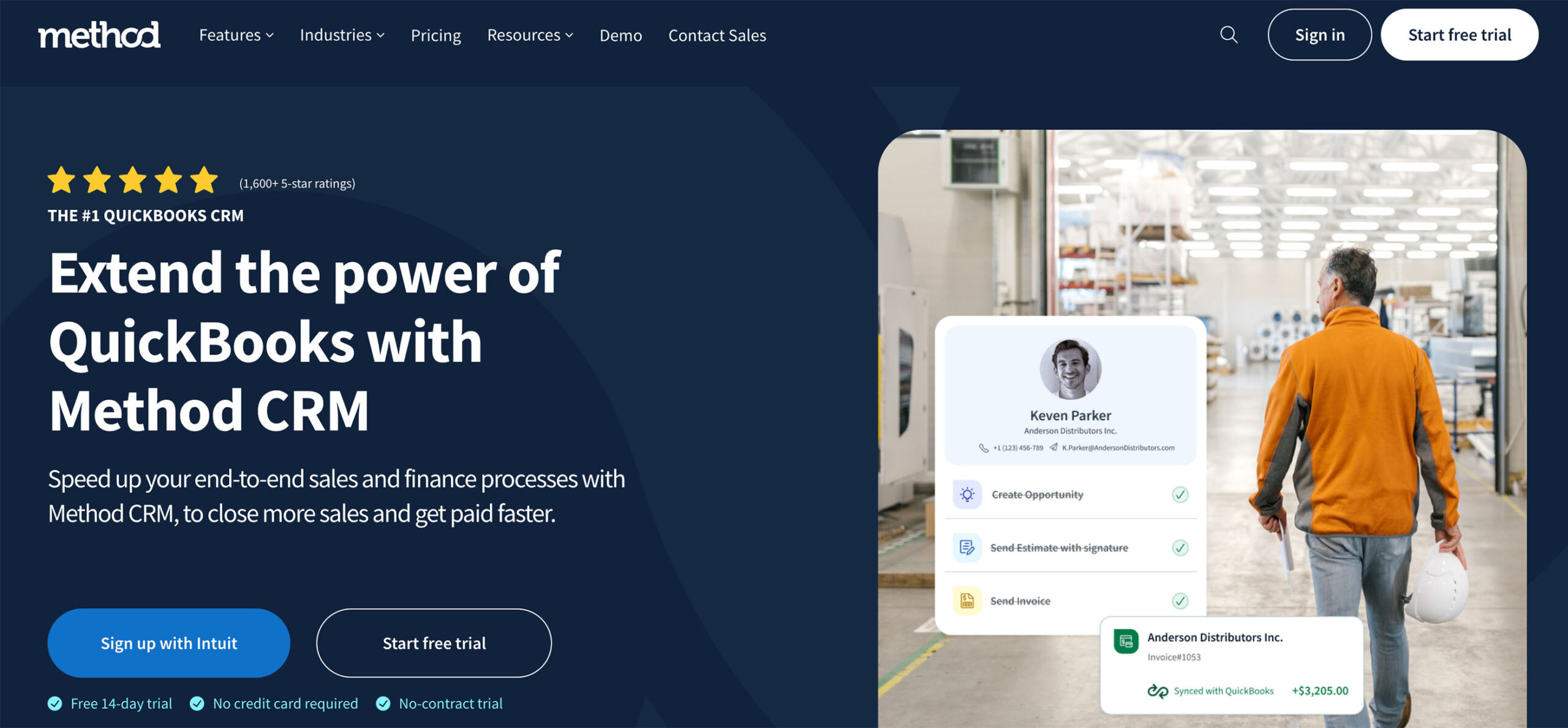
Method CRM stands out as a top choice for logistics management, especially for those using QuickBooks. Its deep integration keeps customer data, invoices, and transactions in sync, eliminating double data entry and reducing errors.
Key features:
- Two-way QuickBooks sync: Automatically updates customer and transaction data between Method and QuickBooks in an instant, bi-directional sync.
- Customizable workflows: Adapt the CRM to fit specific logistics processes, from lead generation tracking to delivery confirmations.
- Customer portals: Provide clients with access to their order status, invoices, and communication history.
- Mobile access: Empower field agents with real-time data on the go.
Why it’s ideal for logistics:
Method CRM’s flexibility allows logistics companies to tailor the system to their unique needs for efficient operations and enhanced customer satisfaction.
| Feature | Available? |
| QuickBooks integration (depth + real-time) | 🟢 Best-in-class, two-way, real-time sync with QuickBooks Online + Desktop. |
| No-code custom workflows | 🟢 Easily create and customize workflows for logistics processes without developer help. |
| Customer self-service portal | 🟢 Built-in portal lets customers approve quotes, view invoices, and submit payments. |
| Multi-QuickBooks company sync | 🟢 Syncs data across multiple QuickBooks companies — rare among CRMs. |
2. Magaya CRM – Comprehensive solution for freight forwarders
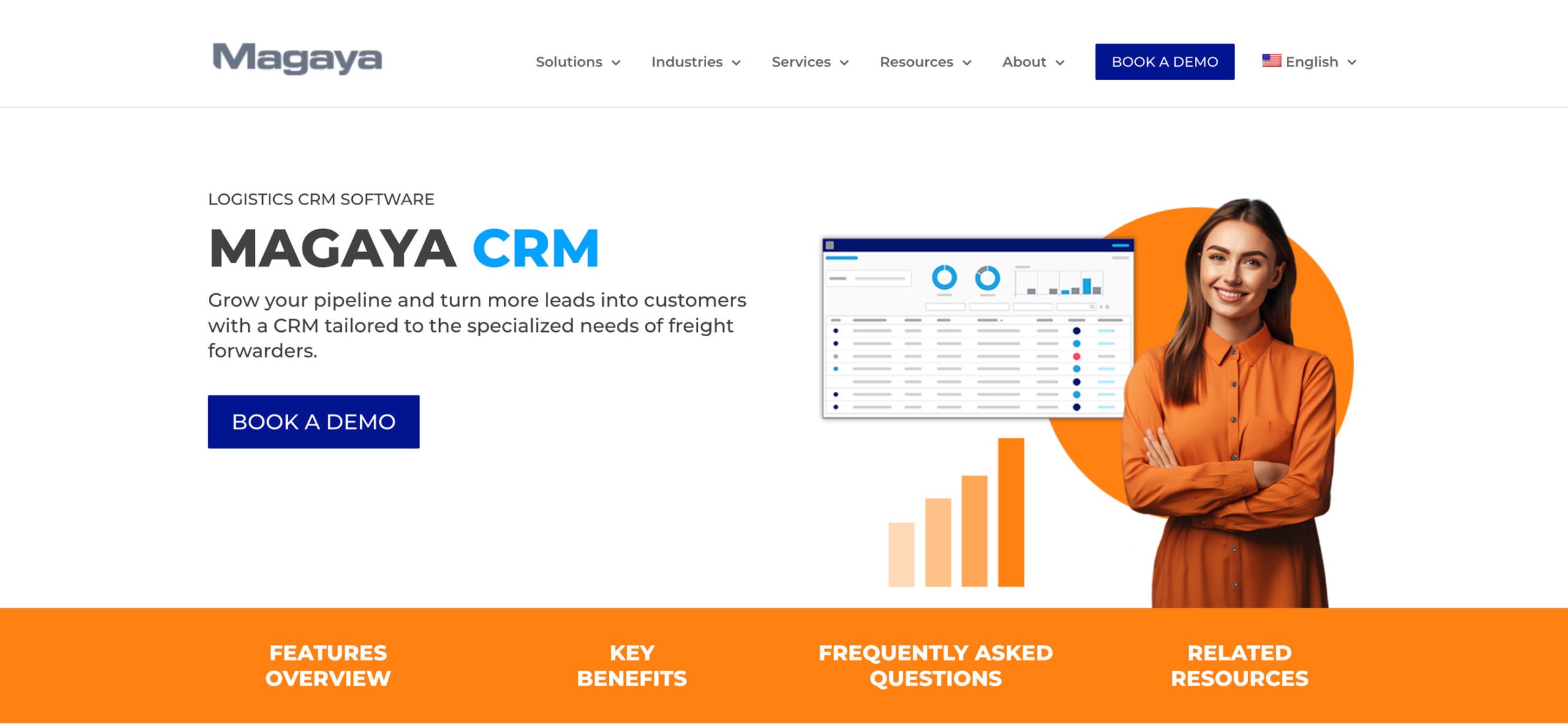
Magaya CRM is designed specifically for freight forwarders, integrating sales, customer service, and operations into a single platform.
Key features:
- Integrated quoting and booking: Streamline the process from lead to shipment.
- Customer relationship management: Maintain detailed records of client interactions and preferences.
- Analytics and reporting: Gain insights into sales performance and customer trends.
Why it’s ideal for logistics:
Magaya CRM’s focus on freight forwarding lets companies manage complex shipments and customer relationships effectively and improve retention.
| Feature | Available? |
| QuickBooks integration (depth + real-time) | 🟡 Integrates with QuickBooks, but focused on accounting exports, not deep sync. |
| No-code custom workflows | 🟡 Customizable workflows but mainly within logistics operations, not broad CRM functions. |
| Customer self-service portal | 🟡 Offers customer visibility portals, but focused on shipment tracking, not invoicing or payments. |
| Multi-QuickBooks company sync | 🔴 Not supported. |
3. Pipedrive – Sales-focused CRM with logistics capabilities
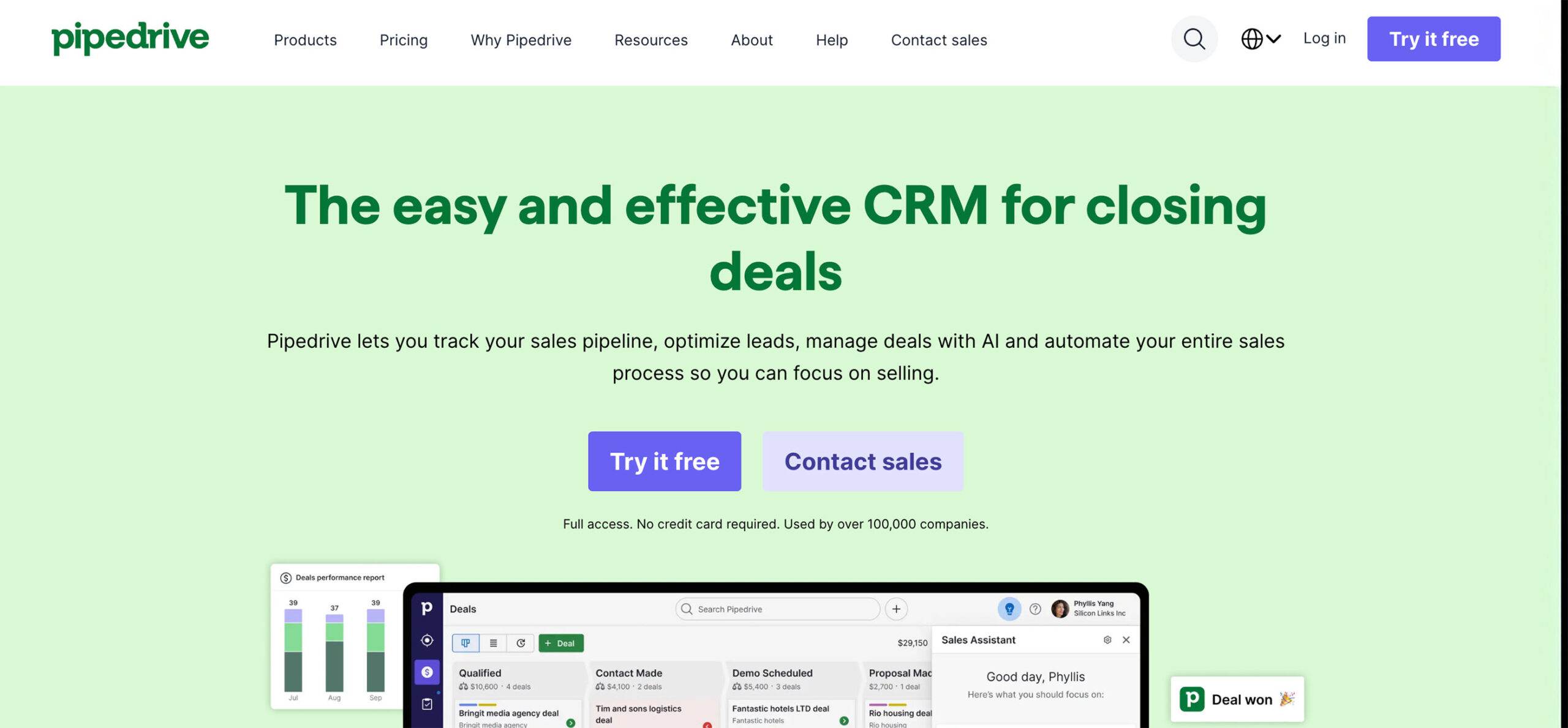
Pipedrive offers a visual sales CRM pipeline that helps logistics companies efficiently manage the sales cycle, including leads and deals.
Key features:
- Customizable pipelines: Adapt stages to match your sales process.
- Email integration: Track communications with clients directly within the CRM.
- Activity reminders: Stay on top of follow-ups and tasks.
Why it’s ideal for logistics:
Pipedrive’s simplicity and focus on sales make it suitable for logistics companies that want to improve their sales processes and customer interactions to increase profitability.
| Feature | Available? |
| QuickBooks integration (depth + real-time) | 🟡 Limited; available via Zapier or other third-party tools. |
| No-code custom workflows | 🟡 Focused on deal stages and pipeline only; limited broader process workflows. |
| Customer self-service portal | 🔴 Not available. |
| Multi-QuickBooks company sync | 🔴 Not available. |
4. HubSpot CRM – Free CRM with robust features
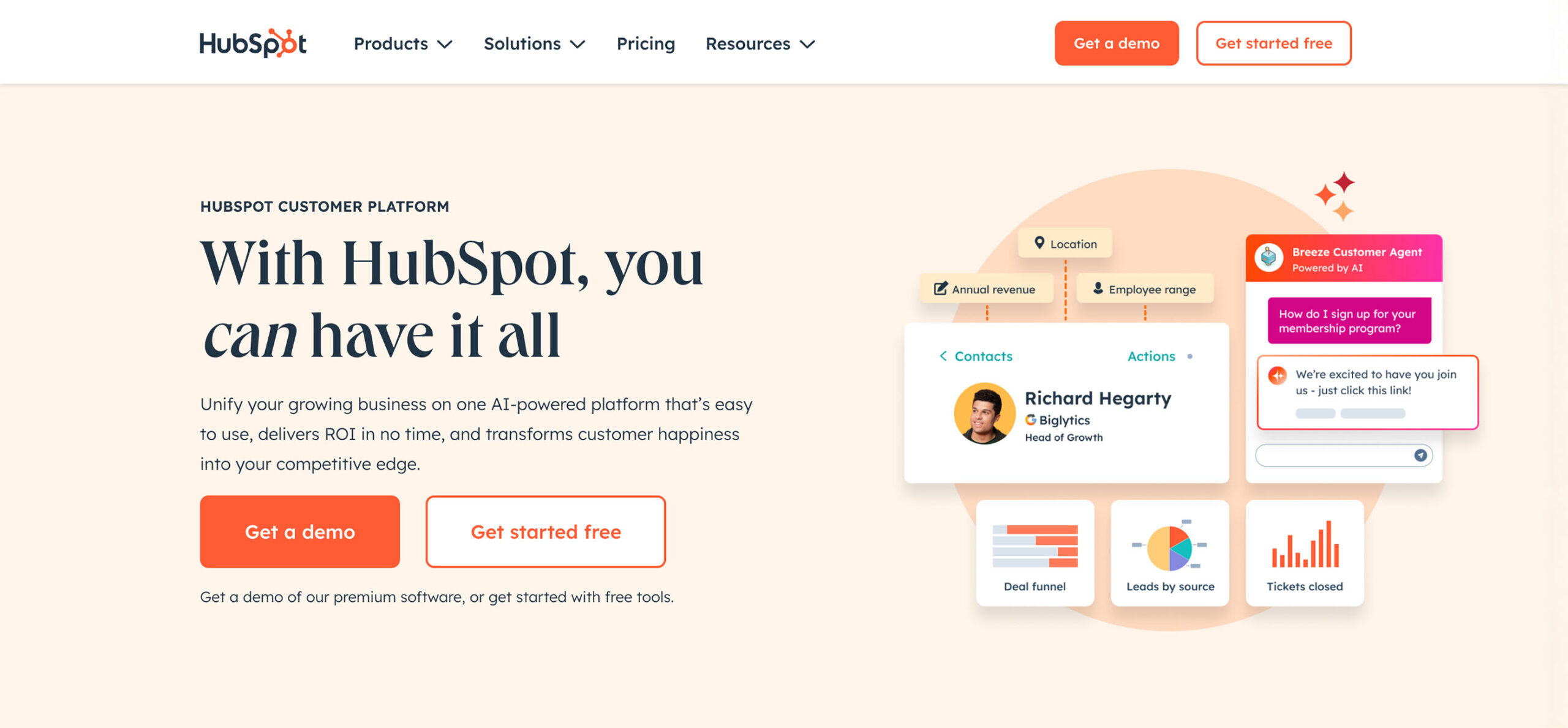
HubSpot CRM offers a free, user-friendly platform, including a mobile app with a range of features beneficial to logistics companies, allowing for operational efficiency.
Key features:
- Contact management: Store and organize customer information for better sales management.
- Email tracking: Monitor client interactions and engagement.
- Reporting dashboard: Visualize sales and customer data.
Why it’s ideal for logistics:
For logistics companies and service providers starting with CRM systems, HubSpot provides a cost-effective solution with essential features to manage customer relationships.
| Feature | Available? |
| QuickBooks integration (depth + real-time) | 🟡 Available through third-party connectors; not native or deep. |
| No-code custom workflows | 🟡 Automation available but mainly in paid tiers; marketing-focused. |
| Customer self-service portal | 🟡 Limited to chatbots or forms; no built-in invoicing/payment portal. |
| Multi-QuickBooks company sync | 🔴 Not available. |
5. Zoho CRM – Customizable CRM for diverse logistics needs
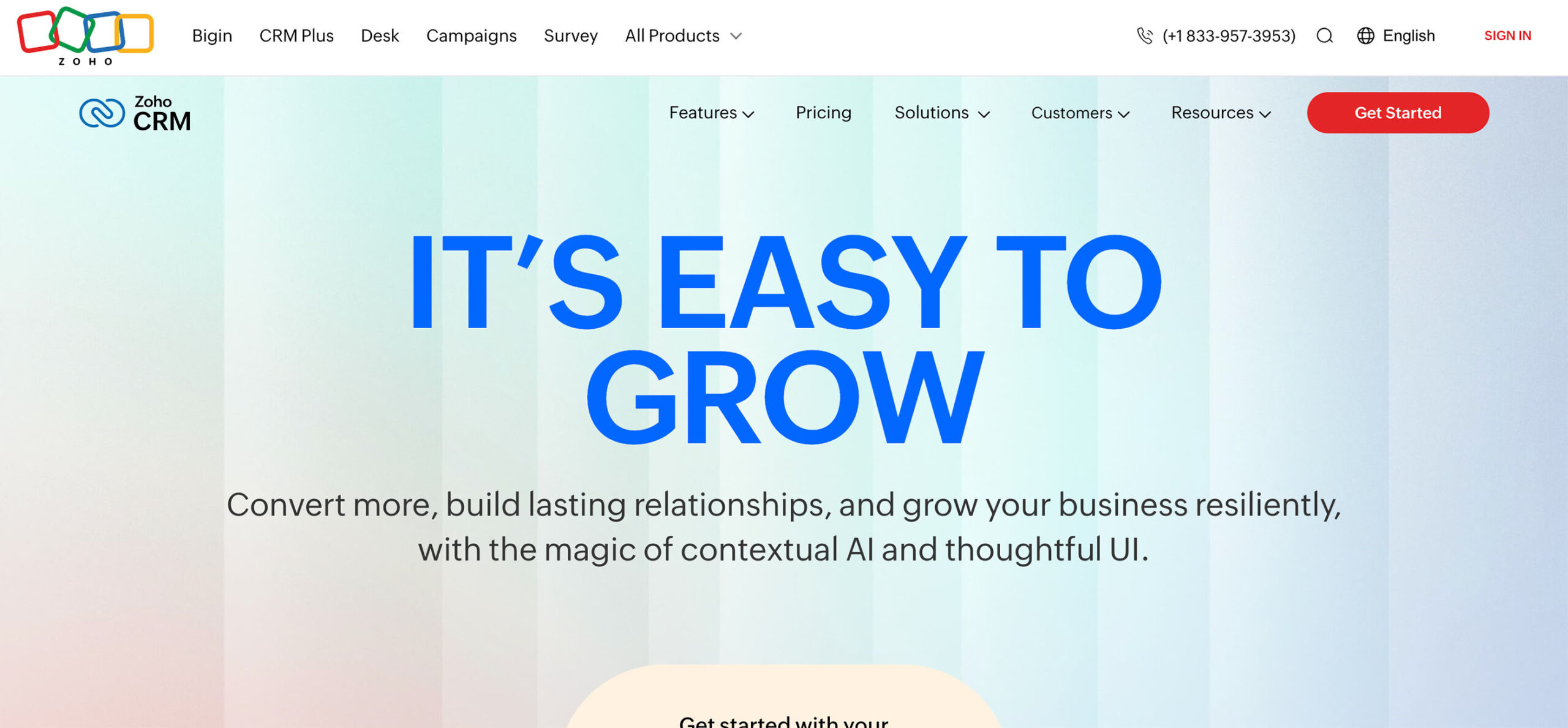
Zoho CRM offers a flexible platform that can be tailored to various stakeholders within logistics operations.
Key features:
- Workflow automation: Automate routine tasks and processes.
- Multichannel communication: Engage with clients via email, phone, and social media.
- Analytics and forecasting: Predict sales trends and customer behaviour.
Why it’s ideal for logistics:
Zoho CRM’s adaptability makes it suitable for logistics companies with diverse needs, allowing for customization to specific workflows and team members.
| Feature | Available? |
| QuickBooks integration (depth + real-time) | 🟡 Connects via Zoho Books or third-party apps; typically one-way, not real-time. |
| No-code custom workflows | 🟢 Good built-in automation; can extend with Zoho Creator (some complexity). |
| Customer self-service portal | 🟡 Available via Zoho Creator or Desk; not native to core CRM. |
| Multi-QuickBooks company sync | 🔴 Not available. |
6. Salesforce CRM – Enterprise-level CRM with extensive features
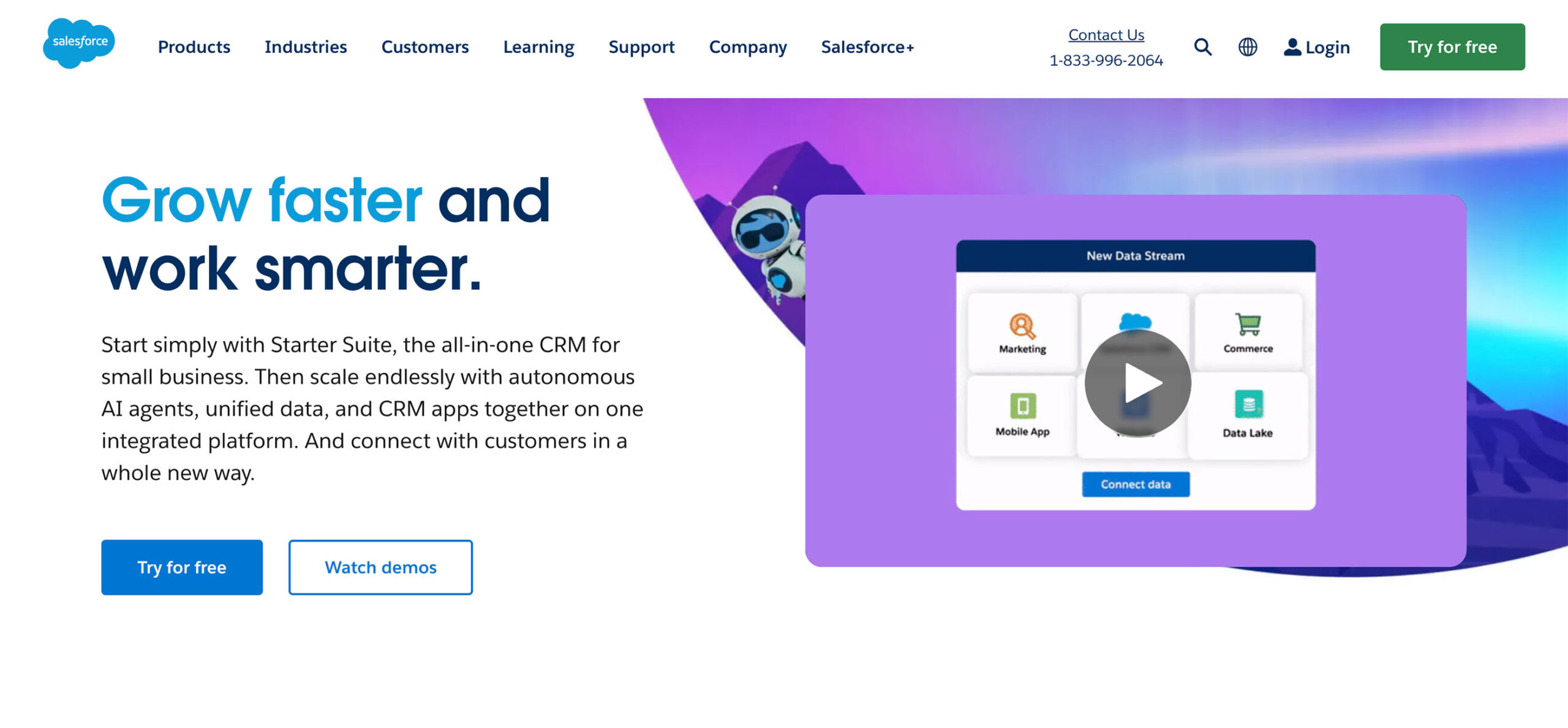
Salesforce CRM is a leading solution for large logistics enterprises seeking comprehensive CRM capabilities.
Key features:
- Advanced analytics: Gain deep insights into customer data and sales performance.
- Custom app development: Build tailored applications within the Salesforce ecosystem.
- Integration capabilities: Connect with various third-party logistics and supply chain tools.
Why it’s ideal for logistics:
Salesforce’s scalability and extensive features make it ideal for large logistics companies aiming to integrate CRM deeply into their operations, including warehouse management.
| Feature | Available? |
| QuickBooks integration (depth + real-time) | 🟡 Available via apps like Breadwinner; setup often requires developers. |
| No-code custom workflows | 🟢 Very strong with Flow Builder, but can require admin or dev resources. |
| Customer self-service portal | 🟢 Available via Experience Cloud, but adds cost and setup complexity. |
| Multi-QuickBooks company sync | 🔴 Not available. |
7. Freshsales – AI-powered CRM for smarter logistics operations
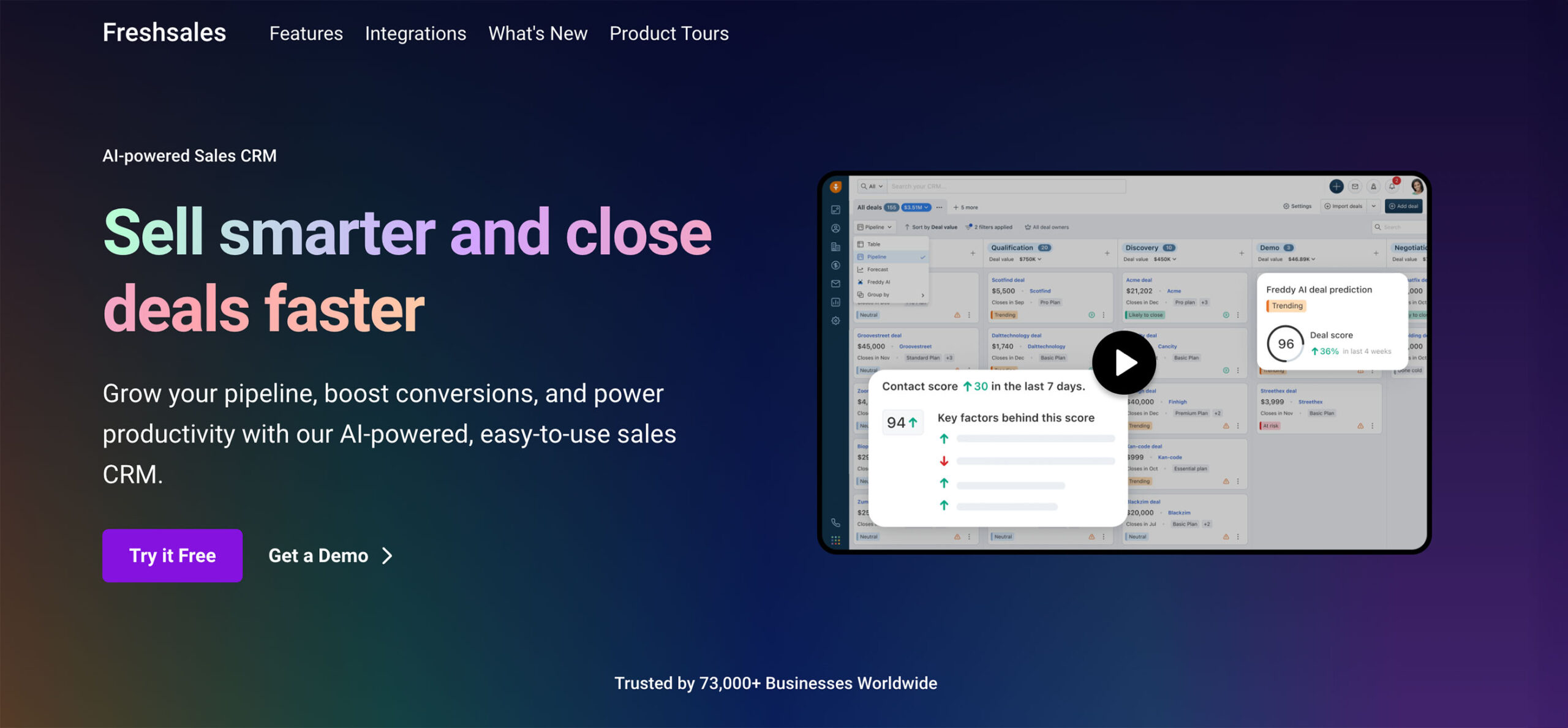
Freshsales by Freshworks offers AI-driven insights to enhance sales and customer engagement in logistics.
Key features:
- Lead scoring: Identify and prioritize high-potential clients.
- Email automation: Streamline communication with customers.
- Sales sequences: Automate follow-ups and outreach.
Why it’s ideal for logistics:
Freshsales’ AI capabilities help logistics companies make data-driven decisions, improving efficiency and customer satisfaction.
| Feature | Available? |
| QuickBooks integration (depth + real-time) | 🟡 Connects via third-party apps like Zapier; not native or deep integration. |
| No-code custom workflows | 🟢 Good visual workflow builder, especially for sales automation. |
| Customer self-service portal | 🔴 Not available. |
| Multi-QuickBooks company sync | 🔴 Not available. |
CRM for logistics: How the top options compare
Each CRM on this list brings something different to the table. The right one for you depends on your size, needs, and how much customization your logistics operation demands.
If you’re looking for deep QuickBooks integration, powerful customization, and a CRM that adapts to your logistics workflows out of the box, Method CRM stands out. It’s ideal for companies that need to unify customer data, automate repetitive tasks, and give clients a self-serve experience, all while keeping accounting in sync.
Magaya CRM is purpose-built for freight forwarders, making it a strong choice if you manage quoting, booking, and international shipments in a single system. Pipedrive is a great, lightweight CRM for logistics companies focused on sales pipelines and lead management.
For companies that are just getting started, HubSpot CRM offers a solid free tier, though you’ll need to upgrade for more advanced features. Zoho CRM is best if you want flexibility and multichannel communication without breaking the bank. Salesforce is the enterprise giant that’s powerful, scalable, and customizable, but often overkill for smaller logistics firms.
Freshsales rounds out the list with smart AI-driven tools that help teams prioritize leads and automate outreach, though it’s more sales-centric than logistics-focused.
No matter which system you choose, the key is finding a CRM that works with your operations, not against them. And with the right setup, tools like Method can bridge the gap between your front office, back office, and the road ahead.
Method CRM Fits Any Logistics Workflow
Choosing the right CRM is crucial for logistics companies aiming to enhance efficiency, customer satisfaction, and overall operations. Whether you’re a small business or a large enterprise, there’s a CRM solution tailored to your needs.
Method CRM stands out for its deep QuickBooks integration and customization capabilities, making it an excellent choice for logistics companies seeking a tailored solution.Ready to transform your logistics operations? Start your free trial of Method CRM today and experience the difference.




